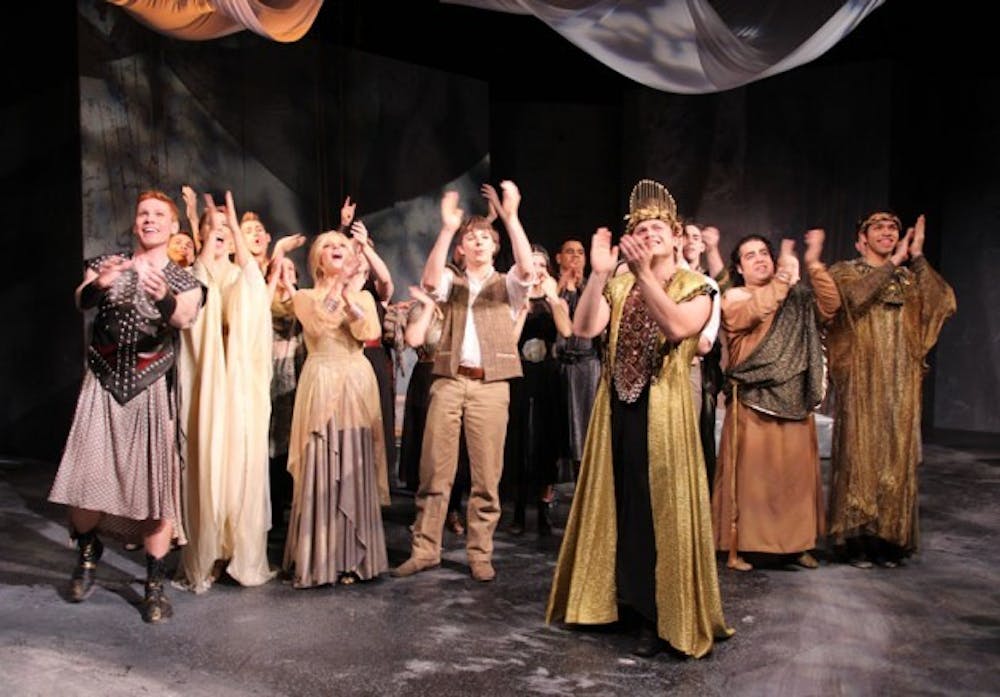After three delays due to the egregious winter storm, the students of UB’s Musical Theatre program proved the show must go on by performing “The Man Who Would Be King” Saturday.
The play was adapted from the Rudyard Kipling novella of the same name. The story follows two British former soldiers and best friends in 1888 British India, who become engrossed in the pursuit for ancient gold hidden in the Hindu Kush Mountains.
Audience members removed their scarves, hats and coats to watch the stunning show in the intimate setting of the Center for the Arts’ Black Box Theatre.
“The Man Who Would Be King” opened with the song “Britannia’s Will.” The male ensemble, complimented with a rustic red backdrop, up-tempo piano and mesmerizing lighting, set the tone for the period musical with their retro outfits of the 19th century.
Peachy and Daniel were introduced to the audience after being kicked out of the army. Peachy provided comic relief to Daniel’s cocky, yet lovable, demeanor; the dichotomy of their friendship took the play to new heights.
Karen Rosen, a Buffalo native, was one of the audience members enthralled with the charismatic performances.
“The actors were so talented, the play was done very well and showed a lot of hard work,” Rosen said. “I enjoyed the energy and the comedic elements of the show.”
“In the Serai” changed the scene of the play to a vibrant marketplace. The play captured the essence of a busy market with the chaos of people’s side conversations and salesmen plotting to rip people off bustling in the background.
The scene was enhanced with up-tempo drums and piano and the actors interacting with the audience, which made viewers feel as if they were also bartering in the marketplace of the Serai.
When arriving in the remote village, Peachy and Daniel put on a disguise to fit in with the villagers.
Daniel is eventually struck by an arrow, which hits a medallion and deceives villagers into believing he is the god, Sikander, because he didn’t bleed.
The two were showered in gold, leaving Daniel wanting to stay in the mountains pretending to be Sikander. This annoyed Peachy and foreshadowed a future break in the friends’ relationship.
UB’s Director of the Music Theatre program and the music director of “The Man Who Would Be King,” Nathan Matthews, explained the importance of telling a story in theater.
“Musical theater is America’s own great art form,” Matthews said. “It weaves the arts together with singing, dancing, acting, lighting, musicians, sound, scenery and costumes.”
After a brief 10-minute intermission, another memorable performance enthralled the audience. “Dance of Ambiguity” gave the play vivacity. The actors danced, sang and waved different colored flags.
The scene depicts Peachy falling in love with Roxane, the future queen Daniel wanted to marry.
While Daniel was treated as a religious Messiah, Peachy was teaching the warriors to be proper soldiers, delivering a captivating performance to the song, “Drill.”
The warriors did as they wished, which irritated Peachy, who asked the warriors to show him how they prepare for battle.
Peachy’s comedic performance and the warriors’ lack of knowledge about guns and warfare kept the audience laughing and engaged.
The warriors astounded the audience with a fast-paced step routine enhanced with their robust shouting and chanting.
As her wedding ceremony to Daniel was steadily approaching, Roxanne plotted to prove Daniel was a mortal.
“The Wedding” was the final scene and ended in tragedy. During the wedding, Roxanne slashed Daniel’s face and revealed his mortality. The villagers became enraged, capturing Daniel and forcing him to cross a rope bridge. He walks across the bridge when they cut the ropes; he accepts his fate and falls to his death.
Peachy left the mountains in a depressed state. He tells the story of his friendship’s demise and the love he lost to a journalist, during the “Epilogue.”
As the play came to a close, the audience roared with applause. When each actor and actress came to the center of the stage for a bow they were met with cheers and whistles of approval. The audience gave them a standing ovation.
Jared Wilson, a Buffalo high school senior, was one of those applauding.
“I’m not usually a fan of tragedies, but the play was so good it really changed my mind,” Wilson said.
“The Man Who Would Be King” dived into how the path to greed can destroy a person as well as their friendships. The play was enchanting and vigorous with raw acting and singing ability. The audience’s applause spoke volumes to how great of a show the actors put on – they truly weathered the storm.
email: arts@ubspectrum.com





